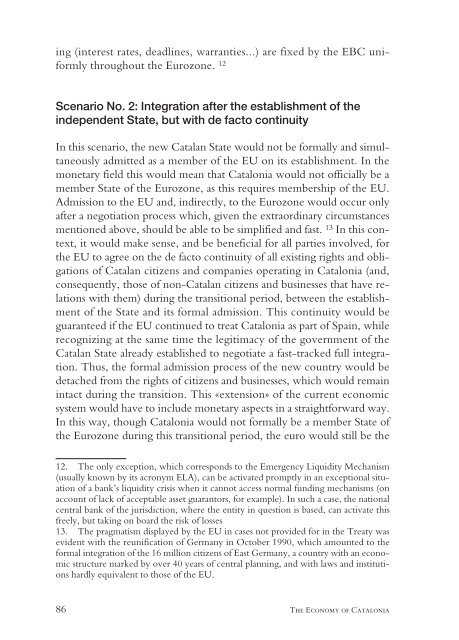The Economy of Catalonia
the_economy_of_catalonia._questions_and_answers_on_the_economic_impact_of_independence
the_economy_of_catalonia._questions_and_answers_on_the_economic_impact_of_independence
Create successful ePaper yourself
Turn your PDF publications into a flip-book with our unique Google optimized e-Paper software.
ing (interest rates, deadlines, warranties...) are fixed by the EBC uniformly<br />
throughout the Eurozone. 12<br />
Scenario No. 2: Integration after the establishment <strong>of</strong> the<br />
independent State, but with de facto continuity<br />
In this scenario, the new Catalan State would not be formally and simultaneously<br />
admitted as a member <strong>of</strong> the EU on its establishment. In the<br />
monetary field this would mean that <strong>Catalonia</strong> would not <strong>of</strong>ficially be a<br />
member State <strong>of</strong> the Eurozone, as this requires membership <strong>of</strong> the EU.<br />
Admission to the EU and, indirectly, to the Eurozone would occur only<br />
after a negotiation process which, given the extraordinary circumstances<br />
mentioned above, should be able to be simplified and fast. 13 In this context,<br />
it would make sense, and be beneficial for all parties involved, for<br />
the EU to agree on the de facto continuity <strong>of</strong> all existing rights and obligations<br />
<strong>of</strong> Catalan citizens and companies operating in <strong>Catalonia</strong> (and,<br />
consequently, those <strong>of</strong> non-Catalan citizens and businesses that have relations<br />
with them) during the transitional period, between the establishment<br />
<strong>of</strong> the State and its formal admission. This continuity would be<br />
guaranteed if the EU continued to treat <strong>Catalonia</strong> as part <strong>of</strong> Spain, while<br />
recognizing at the same time the legitimacy <strong>of</strong> the government <strong>of</strong> the<br />
Catalan State already established to negotiate a fast-tracked full integration.<br />
Thus, the formal admission process <strong>of</strong> the new country would be<br />
detached from the rights <strong>of</strong> citizens and businesses, which would remain<br />
intact during the transition. This «extension» <strong>of</strong> the current economic<br />
system would have to include monetary aspects in a straightforward way.<br />
In this way, though <strong>Catalonia</strong> would not formally be a member State <strong>of</strong><br />
the Eurozone during this transitional period, the euro would still be the<br />
12. <strong>The</strong> only exception, which corresponds to the Emergency Liquidity Mechanism<br />
(usually known by its acronym ELA), can be activated promptly in an exceptional situation<br />
<strong>of</strong> a bank’s liquidity crisis when it cannot access normal funding mechanisms (on<br />
account <strong>of</strong> lack <strong>of</strong> acceptable asset guarantors, for example). In such a case, the national<br />
central bank <strong>of</strong> the jurisdiction, where the entity in question is based, can activate this<br />
freely, but taking on board the risk <strong>of</strong> losses<br />
13. <strong>The</strong> pragmatism displayed by the EU in cases not provided for in the Treaty was<br />
evident with the reunification <strong>of</strong> Germany in October 1990, which amounted to the<br />
formal integration <strong>of</strong> the 16 million citizens <strong>of</strong> East Germany, a country with an economic<br />
structure marked by over 40 years <strong>of</strong> central planning, and with laws and institutions<br />
hardly equivalent to those <strong>of</strong> the EU.<br />
86 <strong>The</strong> <strong>Economy</strong> <strong>of</strong> <strong>Catalonia</strong>


